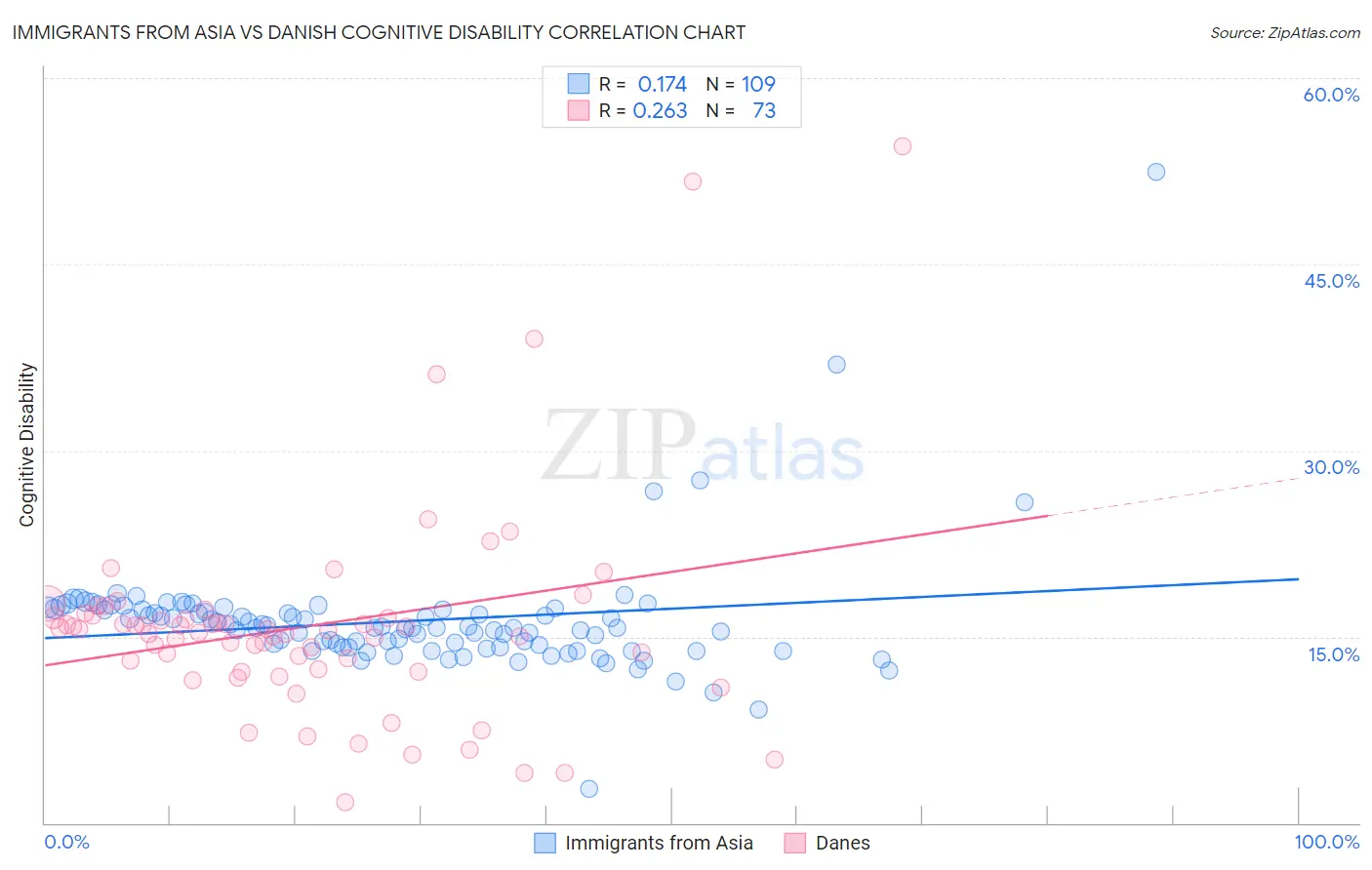Immigrants from Asia vs Danish Cognitive Disability
COMPARE
Immigrants from Asia
Danish
Cognitive Disability
Cognitive Disability Comparison
Immigrants from Asia
Danes
16.8%
COGNITIVE DISABILITY
98.1/ 100
METRIC RATING
101st/ 347
METRIC RANK
16.7%
COGNITIVE DISABILITY
98.8/ 100
METRIC RATING
91st/ 347
METRIC RANK
Immigrants from Asia vs Danish Cognitive Disability Correlation Chart
The statistical analysis conducted on geographies consisting of 549,051,974 people shows a poor positive correlation between the proportion of Immigrants from Asia and percentage of population with cognitive disability in the United States with a correlation coefficient (R) of 0.174 and weighted average of 16.8%. Similarly, the statistical analysis conducted on geographies consisting of 474,128,115 people shows a weak positive correlation between the proportion of Danes and percentage of population with cognitive disability in the United States with a correlation coefficient (R) of 0.263 and weighted average of 16.7%, a difference of 0.31%.

Cognitive Disability Correlation Summary
| Measurement | Immigrants from Asia | Danish |
| Minimum | 2.7% | 1.7% |
| Maximum | 52.5% | 54.5% |
| Range | 49.8% | 52.9% |
| Mean | 16.2% | 15.8% |
| Median | 15.7% | 15.5% |
| Interquartile 25% (IQ1) | 14.1% | 12.3% |
| Interquartile 75% (IQ3) | 17.2% | 16.6% |
| Interquartile Range (IQR) | 3.1% | 4.3% |
| Standard Deviation (Sample) | 5.0% | 8.6% |
| Standard Deviation (Population) | 4.9% | 8.6% |
Demographics Similar to Immigrants from Asia and Danes by Cognitive Disability
In terms of cognitive disability, the demographic groups most similar to Immigrants from Asia are Immigrants from Russia (16.8%, a difference of 0.0%), Irish (16.8%, a difference of 0.030%), Jordanian (16.8%, a difference of 0.040%), Paraguayan (16.8%, a difference of 0.070%), and Palestinian (16.8%, a difference of 0.070%). Similarly, the demographic groups most similar to Danes are Immigrants from Egypt (16.7%, a difference of 0.010%), South American (16.7%, a difference of 0.010%), Immigrants from South America (16.7%, a difference of 0.010%), Immigrants from Southern Europe (16.7%, a difference of 0.020%), and Asian (16.7%, a difference of 0.060%).
| Demographics | Rating | Rank | Cognitive Disability |
| Immigrants | South Africa | 99.0 /100 | #86 | Exceptional 16.7% |
| Native Hawaiians | 99.0 /100 | #87 | Exceptional 16.7% |
| Immigrants | Philippines | 99.0 /100 | #88 | Exceptional 16.7% |
| Immigrants | Egypt | 98.8 /100 | #89 | Exceptional 16.7% |
| South Americans | 98.8 /100 | #90 | Exceptional 16.7% |
| Danes | 98.8 /100 | #91 | Exceptional 16.7% |
| Immigrants | South America | 98.8 /100 | #92 | Exceptional 16.7% |
| Immigrants | Southern Europe | 98.7 /100 | #93 | Exceptional 16.7% |
| Asians | 98.7 /100 | #94 | Exceptional 16.7% |
| English | 98.6 /100 | #95 | Exceptional 16.8% |
| Finns | 98.5 /100 | #96 | Exceptional 16.8% |
| Dutch | 98.5 /100 | #97 | Exceptional 16.8% |
| Immigrants | Lebanon | 98.4 /100 | #98 | Exceptional 16.8% |
| Jordanians | 98.2 /100 | #99 | Exceptional 16.8% |
| Immigrants | Russia | 98.2 /100 | #100 | Exceptional 16.8% |
| Immigrants | Asia | 98.1 /100 | #101 | Exceptional 16.8% |
| Irish | 98.1 /100 | #102 | Exceptional 16.8% |
| Paraguayans | 98.0 /100 | #103 | Exceptional 16.8% |
| Palestinians | 98.0 /100 | #104 | Exceptional 16.8% |
| Immigrants | Eastern Asia | 97.9 /100 | #105 | Exceptional 16.8% |
| Northern Europeans | 97.8 /100 | #106 | Exceptional 16.8% |